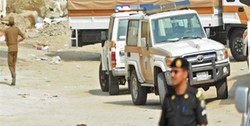 Saudi Arabia has imposed a lockdown on the oil-rich and Shia-populated Qatif region with an excuse to prevent the spread of coronavirus.
Saudi Arabia has imposed a lockdown on the oil-rich and Shia-populated Qatif region with an excuse to prevent the spread of coronavirus. RNA - In a statement released on Sunday, the Saudi Interior Ministry said no one would be allowed to enter or exit Qatif and that work at all public and private sectors in the region had been suspended with the exception of institutions providing necessary services.
“Given that all 11 recorded positive cases of the new coronavirus are from Qatif... it has been decided... to temporarily suspend entry (into) and exit from Qatif,” the statement read.
Residents in Eastern Province, which includes Qatif, have long demanded an end to what they say is discrimination by the Riyadh regime.
Saudi Arabia has faced protests since 2011, when a wave of uprisings hit dictatorial Arab monarchies in West Asia and North Africa.
The kingdom has stepped up security measures in the region, which has also witnessed deadly shootings and bombings targeting security forces or Shia residents.
Saudi Arabia has also increased politically-motivated arrests, prosecution and conviction of peaceful dissident writers and human rights campaigners.
Anti-regime protests intensified in the province after the January 2016 execution of prominent Shia cleric Sheikh Nimr Baqir al-Nimr, an outspoken critic of the Al Saud ruling dynasty.
In 2017, Saudi regime forces stormed the ancient village of Maswarah in the same province. Authorities were said to be seeking to tear down homes belonging to the poor locals under the pretext of developing the region.
The Eastern Province governor's office stressed at the time that Maswarah and similar ancient villages should not be demolished as such raids were inconsistent with the instructions for preserving historic sites.
Last month, a media report said Saudi authorities will execute a dozen imprisoned minor dissidents from Eastern Province.
The Lebanon-based Arabic-language al-Ahed news website, citing sources from the European Saudi Organization for Human Rights (ESOHR), reported that the Qatif residents are facing death penalty at various levels of litigation.
Among the detainees already on the death row is Muhammad Issam al-Faraj, born in 2002, who faced charges before reaching the age of ten.
Those executed are buried alone and their families are not allowed to bid farewell or receive their loved ones’ wills.
Human rights organizations have repeatedly criticized Britain and the United States for giving the Saudi regime an easy pass on perpetrating human rights abuses on its own people.
847/940